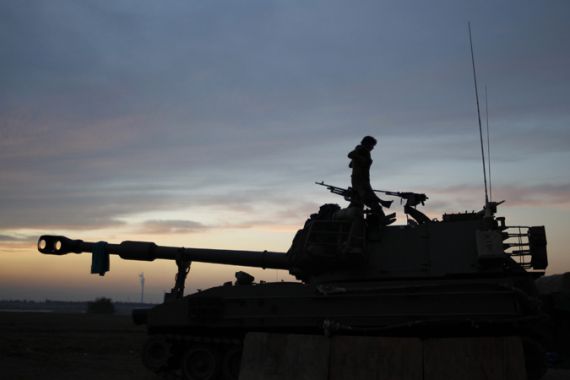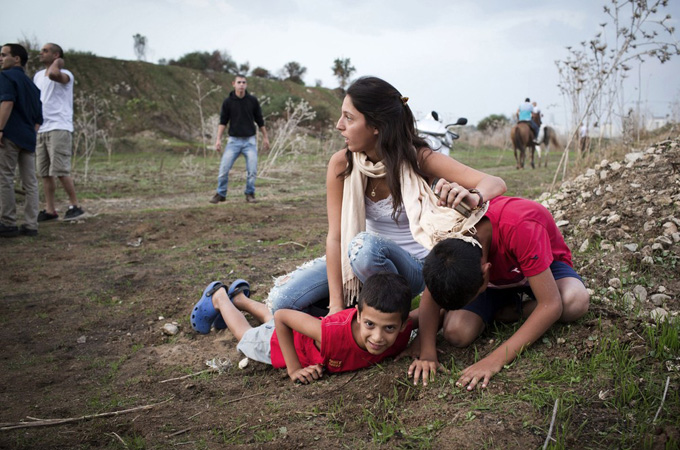Israeli pessimism over Hamas ceasefire
The first bus bombing in Tel Aviv in years was a signal for many to intensify attacks on Gaza, not agree to a truce.

Tel Aviv – The ceasefire agreed in Cairo between Hamas and Israel so far appears to be holding, but the prospect of peace has generated little enthusiasm among Israeli citizens.
The deal went into effect at 9pm Egypt time on Wednesday, and Gaza erupted in joy minutes later with fireworks, celebratory gunfire, and parades in the streets.
The response on the other side of the border was muted, however. Israeli TV showed pictures of a few dozen people celebrating in the streets, but most Israelis reacted with skepticism, even anger.
Talking heads on television spent hours analysing whether the Israeli army had accomplished its goals, and whether the truce would hold. A snap poll from Channel 2 news found 70 per cent of the Israeli public opposed to the deal, with just 24 per cent in favour.
The opposition to a ceasefire was apparent earlier on Wednesday in Tel Aviv, where a bus bombing wounded more than two dozen Israelis. Hamas did not claim responsibility for the attack, and two Israeli security sources suggested it might have been the work of “freelancers”, rather than an organised group.
Israeli police also acknowledged, albeit obliquely, that the bombing might have been the work of a solitary attacker.
“We’re investigating whether it was one person who attacked or whether there were specific orders that were given,” said Micky Rosenfeld, a police spokesman.
Nonetheless, many people responded to the bombing – the first in Tel Aviv in years – by calling for further escalation in Gaza. The government approved the truce over widespread public objection – a decision that might make it short-lived.
‘This is our reality’
The bus bombing quickly faded into the bustle of ordinary life in Israel’s commercial capital. The device – small and crudely made, according to police – exploded around noon. Twenty-eight people were taken to the hospital, three with serious shrapnel wounds. Most of the passengers were treated for shock and released.
A few hours later, the lightly damaged bus had been towed away for forensic investigation, the road was open to traffic, and office workers lingered in cafés. An Israeli soldier wandered down the street carrying a handful of “happy birthday” balloons.
 |
| A woman and children take cover as sirens wail in Tel Aviv. [AFP] |
“This is our reality,” said Poli Grishanov, an X-ray technician sipping a coffee some 200 metres down the road from the site of the explosion. “It’s not the first one … a few years ago, this was a reality in all of Israel.”
But the attack nonetheless further hardened public opinion regarding the Israeli military offensive in Gaza, which ended on Wednesday, its eighth day. Tel Aviv had been mostly peaceful over the past week. Three rockets were fired towards the city, but none did any damage. The bus bombing ended that relative quiet.
“In any other country they would have wiped out Gaza already,” said Mishal Seiler, an office worker near the site of the bombing. “But because of the political pressure on Israel, we cannot do this.”
Of more than a dozen Israelis interviewed in Tel Aviv after the blast, only one supported an immediate ceasefire. Their opinions were mixed about a possible ground invasion, but almost all wanted to see a sustained bombing campaign directed at Gaza.
‘The public view is different’
Contrary to public opinion, though, the Israeli government’s response to the bombing was fairly muted – perhaps because they hoped the ceasefire talks would succeed, and perhaps, as one source suggested, because of pressure from US Secretary of State Hillary Clinton, who helped broker the truce.
Deputy Knesset speaker Danny Danon, one of the most conservative members of the Likud party, called for war, telling reporters “the time for restraint is over”. But the senior members of Prime Minister Binyamin Netanyahu’s cabinet mostly kept quiet.
Retired Col. Itamar Ya’ar, formerly a senior member of Israel’s national security council, said the attack did not markedly shift the government’s calculations.
“The government does not see any difference in this attack. What’s the difference between a bomb and a rocket?” Ya’ar said in an interview on Wednesday afternoon, before the deal was announced.
“But the public view is different … the public view sees this as much worse. The government faced some higher pressure not to compromise in the ceasefire talks.”
The Israeli government itself was divided over the ceasefire, with several officials, including Interior Minister Eli Yishai, in favour of proceeding with a ground invasion, according to a report on Channel 10. Ultimately, though, the three key ministers – Netanyahu, Foreign Minister Avigdor Lieberman, and Defence Minister Ehud Barak – approved the ceasefire deal.
All three declared the operation a success during a press conference on Wednesday night, but their tone was subdued.
|
“Hamas doesn’t stop until it feels that pressure … It won’t stop until the Israeli army’s hands are around its neck. “ – Ori Dayan, Tel Aviv resident |
Netanyahu, in particular, displayed little of his trademark swagger. He certainly looked less confident than Khaled Meshaal, the political leader of Hamas, who held a press conference in Cairo and declared the past week proof that resistance is an effective strategy.
That lack of enthusiasm was not lost on the Israeli public, which widely expects the ceasefire to collapse in the coming weeks. Security analysts said the deal’s unpopularity will make the government more likely to stage a major retaliation against even a few rockets fired from Gaza over the next few months.
And many Israelis see that as a likely event. The Channel 2 poll found that 24 per cent of citizens think it will immediately collapse, and 64 per cent think it will only last for “a brief period”.
“It’s necessary. Hamas doesn’t stop until it feels that pressure,” said Ori Dayan, a Tel Aviv resident, referring to the bombing campaign. “We don’t have any choice. It won’t stop until the Israeli army’s hands are around its neck.”